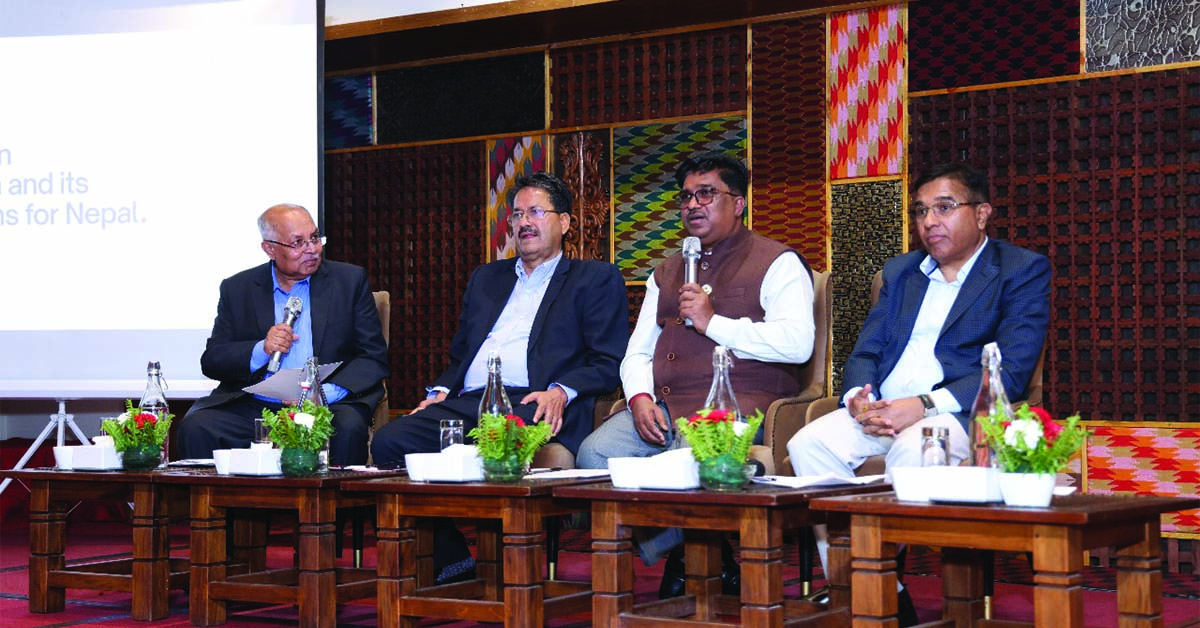

 21.53°C काठमाडौं
21.53°C काठमाडौं

Kathmandu: The Centre for Social Innovation and Foreign Policy (CESIF) organized a seminar on “Terrorism in South Asia and its Implications for Nepal” on June 2, 2025, in Kathmandu. The seminar discussed the persistent threat of terrorism in South Asia and its specific repercussions for Nepal, focusing on Nepal’s vulnerabilities and the need for effective countermeasures.
According to the release by CESIF, the seminar commenced with welcome remarks by CESIF’s Executive Chairperson, Amb. Vijay Kant Karna, who emphasized the serious and evolving nature of terrorism in South Asia and its direct effects on Nepal. He highlighted Nepal’s vulnerability as a potential transit point for terrorist operatives, citing instances like the IC 814 hijack, and the victimization of Nepali citizens in terrorist acts, such as the recent Pahalgam terrorist attack and the 2006 Jammu and Kashmir attack on migrant workers.
The first panel focused on “Policy Response for addressing the implications of terrorism for Nepal” and explored Nepal’s responses to terrorism, underscoring institutional weaknesses, regional complexities, and the urgent need for a strategic shift in national security thinking. Hon. N.P. Saud, Member of Parliament, Former Foreign Minister of Nepal, stressed that terrorism in South Asia poses a serious spillover risk for Nepal, warning that “vulnerabilities are no longer only at others’ homes—we are also open to them.”
He highlighted systemic flaws in immigration management, referencing past lapses like the IC 814 incident, where Nepal failed to classify the perpetrators as terrorists or coordinate diplomatically with the country of origin of the terrorists. He called for integrated immigration-security mechanisms and cautioned that ad hoc responses yield no long-term protection. Hon. Raj Kishore Yadav, Member of Parliament, noted Nepal’s silence on the Pahelgam attack as a diplomatic misstep and lamented Parliament’s continued failure to frame terrorism as a national issue. He asserted, “Nepal should have been more assertive and explicitly sided with the victim side”.
Mr. Shanker Das Bairagi, Former National Security Advisor and Foreign Secretary emphasized Nepal’s normative commitments to international conventions but admitted that the implementation gap “depreciates our credibility.” He identified immigration and intelligence as critical vulnerabilities and called for institutional reforms to enhance data sharing and deterrence capabilities. During the Q&A session Amb. Durga Bhattarai noted that “terrorism anywhere is terrorism everywhere” and raised questions about Nepal’s reactive posture and lack of extradition consistency.
Amb. Dinesh Bhattarai traced the ideological roots of South Asian terrorism to the differences in religion, and statistically noted, Hindus are the clear target. Overall, the panel called for Nepal to move beyond symbolic condemnation and invest in cohesive legal, diplomatic, and institutional frameworks that treat terrorism as a real and present threat to national security.
The second panel explored “Nepal’s Security Vulnerabilities and Citizen Implications,” with speakers calling for a more assertive and strategically aligned national security posture.Maj. Gen. (Retd.) Binoj Basnyat highlighted the shifting nature of warfare in South Asia, shaped by technology, proxy conflicts, and big power rivalries, noting that Nepal’s counterterrorism efforts currently rely heavily on soft diplomacy but lack proactive mechanisms.
“We must revisit the way our security is maintained,” he said, emphasizing that Nepal’s experience with past insurgencies does not adequately prepare it for emerging transnational threats. Amb. Madhu Raman Acharya strongly urged Nepal to take a principled stance on regional terrorism, particularly in cases like the Pahelgam attack, stating that “Nepal should have clearly sided with India” and used such incidents as diplomatic openings to build trust with India. Columnist and Writer Amish Mulmi echoed this sentiment, pointing out that although terrorism may not originate in Nepal, it directly affects the country through its migrant population and regional dynamics.
He noted that “as terrorism has clarity in target based on religion, counterterrorism efforts should also have clarity in response.” He observed that the regional security landscape is undergoing a doctrinal shift, where India now treats any act of terror as an act of war and no longer differentiates between state-backed and non-state actors. Apekshya Shah called for better intelligence coordination and academic capacity-building. She stressed the need to counter radicalization, misinformation, and security illiteracy through research-based academic and policy discourse.
Overall, the panel underscored Nepal’s need to reassess its neutrality-based foreign policy, invest in evidence-based counterterrorism capacity, and elevate national conversations on security beyond the government to include academia and civil society.
The seminar concluded with a unanimous agreement among all the speakers regarding the missed opportunity to clearly and openly stand with India and condemn the terrorist attack on Pahalgam. It was attended by various stakeholders, including policymakers, security analysts, government officials, academics, and representatives from civil society and international organizations.
The discussions underscored the importance of enhanced understanding, strengthened security measures, and proactive policy responses to address the complex challenges posed by terrorism in South Asia and its implications for Nepal.